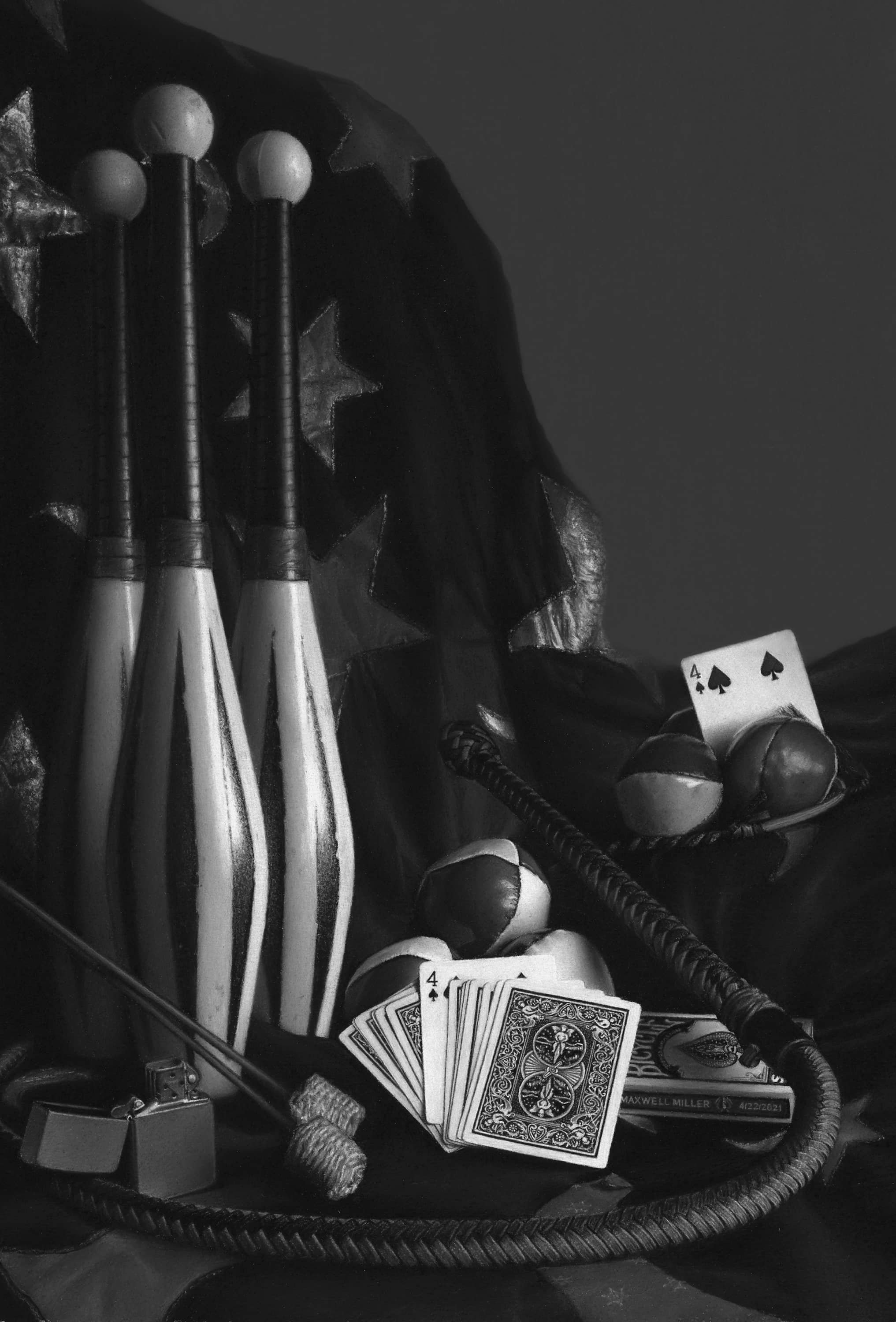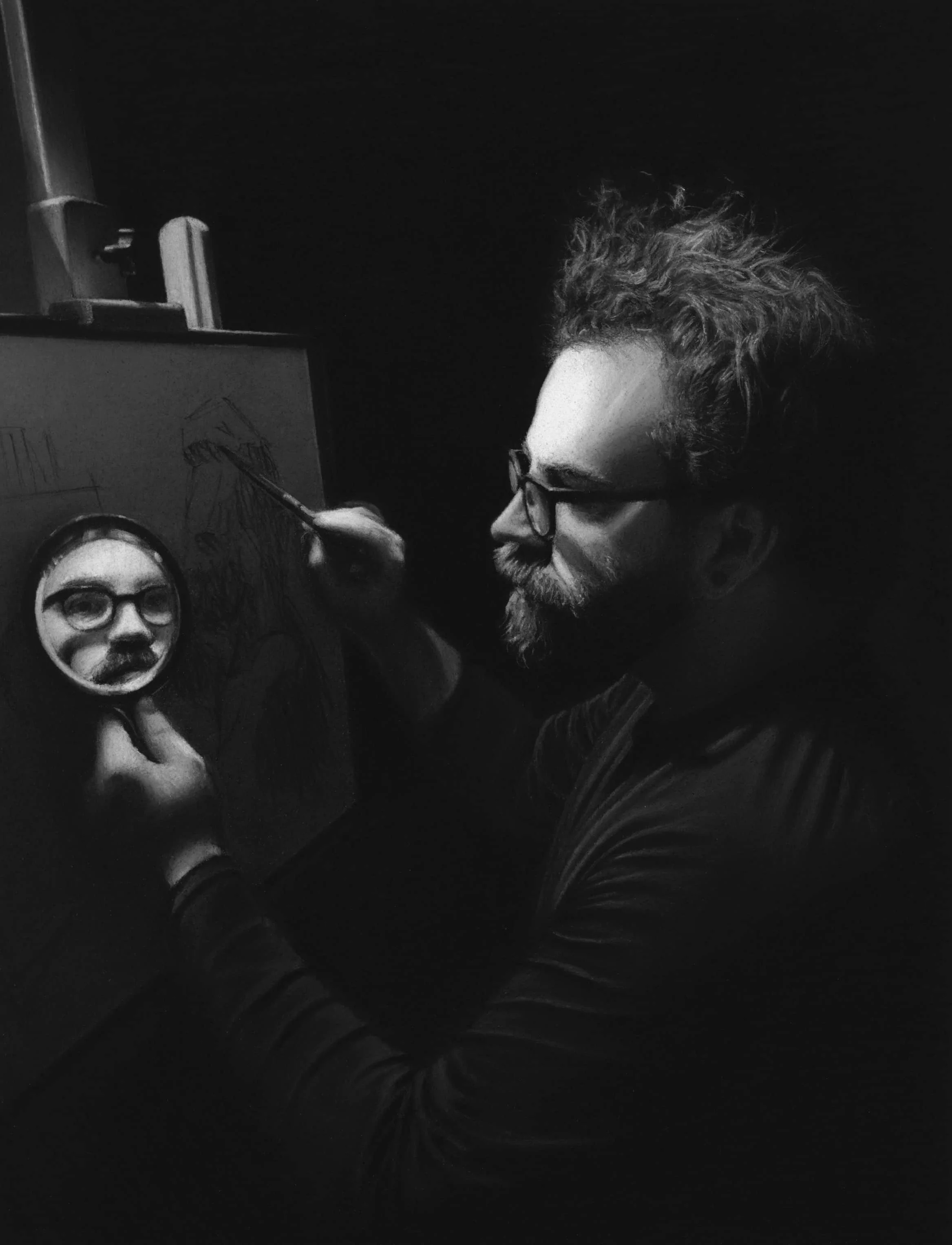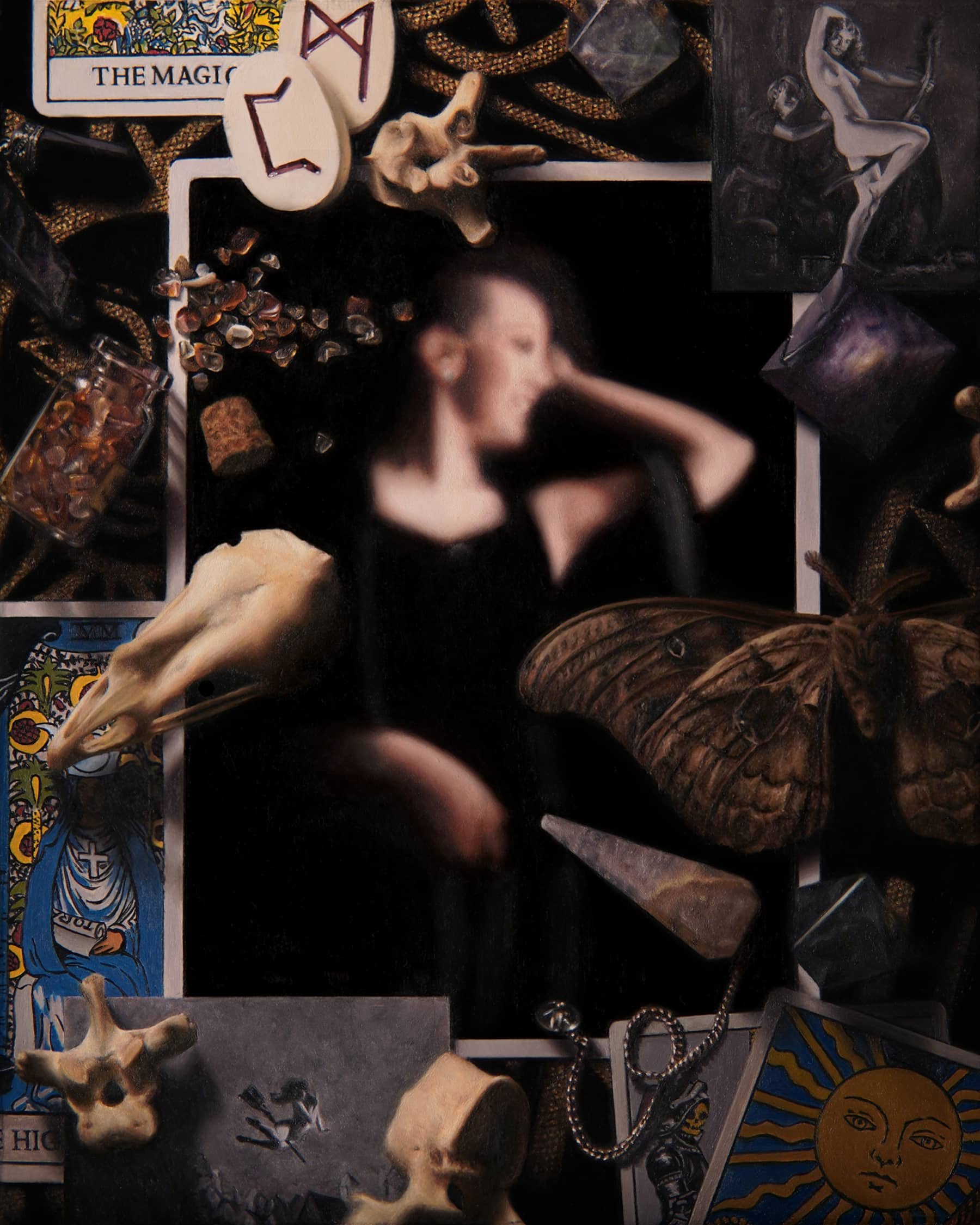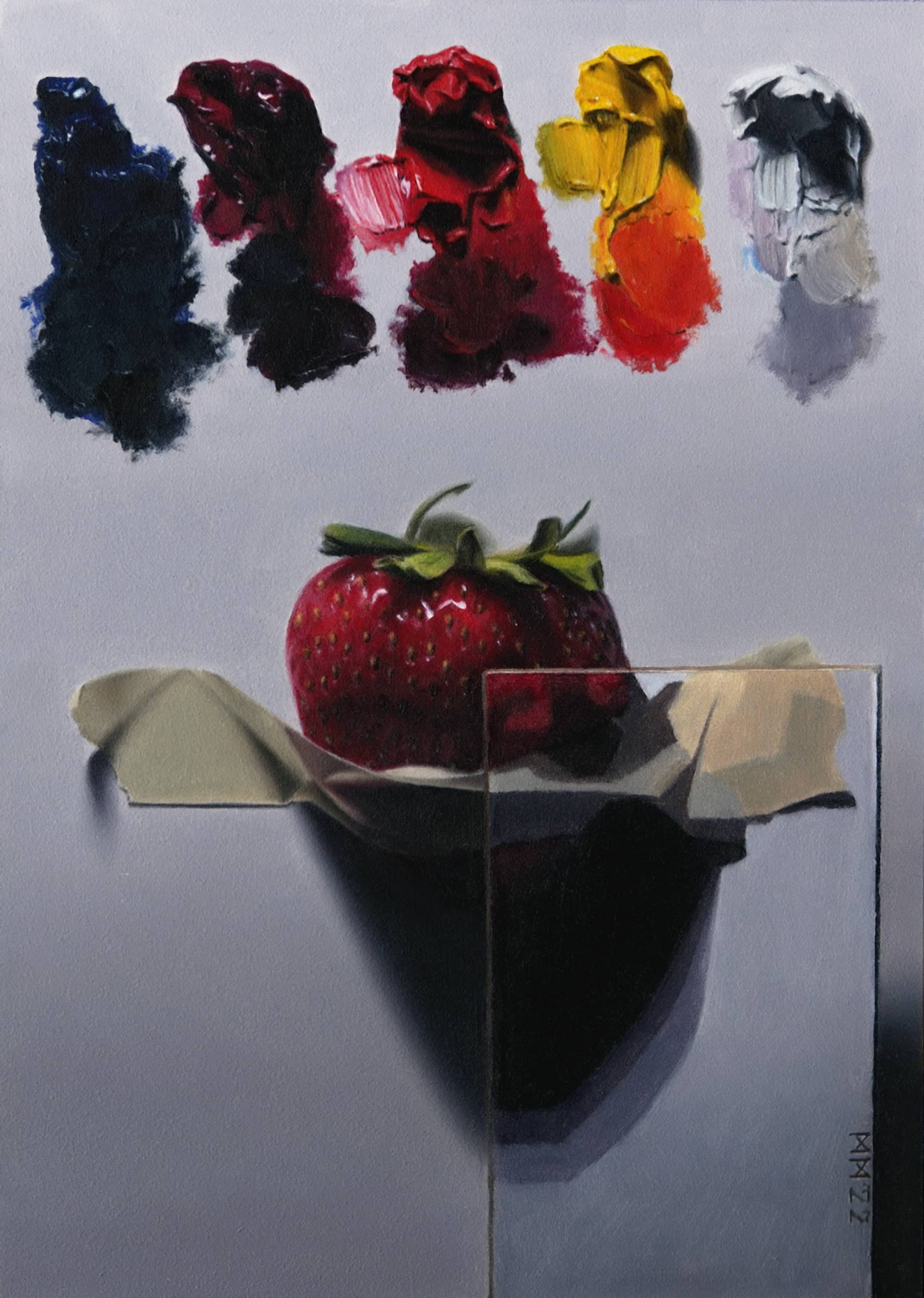Artist Maxwell G. Miller
Congratulations to Maxwell G. Miller for earning his place as the 1st Place winner in the Boynes Emerging Artist Award 8th Edition [Professional Category]!
Who are you?
I’m an American contemporary realist artist, working in the Dominican Republic. I started out in the theatrical arts working as a performer, director, and artistic designer specializing in large-scale puppetry. After a particularly successful artistic design project in 2016, I found that I really enjoyed the visual art aspect of it and decided to pursue it full-time. As I studied, I developed an interest in mythology and history painting and found myself drawn to realism. That’s when I began my apprenticeship with trompe-l'œil artist Anthony Waichulis. I completed my apprenticeship in 2022 and now serve as the Dean of the ÀNI Art Academies Dominicana.
“Behind the Curtain”
Charcoal on Paper
By Maxwell G. Miller
What inspired you to utilize painting as a medium?
Art history. Painting has been such an influential part of history in general. It gives artists the ability to communicate ideas, philosophies, and opinions, all within a single image. I’m intrigued by how impactful that can be. Paintings are the type of thing that you can look at hundreds and hundreds of years later, and the message has still reached you.
I also like that it’s an extremely high skill ceiling. Painting is a significant challenge. I’m inspired by the progress and the improvement.
“Cervicalgia”
Charcoal
By Maxwell G. Miller
How would you describe your work?
There’s a revival of realism happening now that I strive to be a part of. As I mentioned before, I developed a particular interest in mythology and history painting early on, and my work has become somewhat of an extension of this style of storytelling. Realism gives me the ability to clearly communicate stories through recognizable imagery. I find inspiration in other artistic media - music, movies, tv shows, folklore, mythology - but I’m most inspired by theatrical arts and puppetry. I enjoy creating artwork containing several figures or dense still-life, and most of my work falls somewhere in that range.
“Lead Soldier”
Charcoal
By Maxwell G. Miller
Can you discuss the inspiration and thought process behind your winning work?
Well, it’s a self-portrait, but I wanted to approach it more as a still life. The purpose of it is not to make it all about me, but about the journey toward mastery. I’ve previously titled my self-portraits “Self Portrait” and the year. But this one I call “The Journeyman”. The objects surrounding me represent learned skills and crafts that have served as creative inspiration. I put myself on the same plane as everything else, like I’m one of the objects. I included a previous self-portrait from 3 years prior on the left specifically to show the progress of my journey so far.
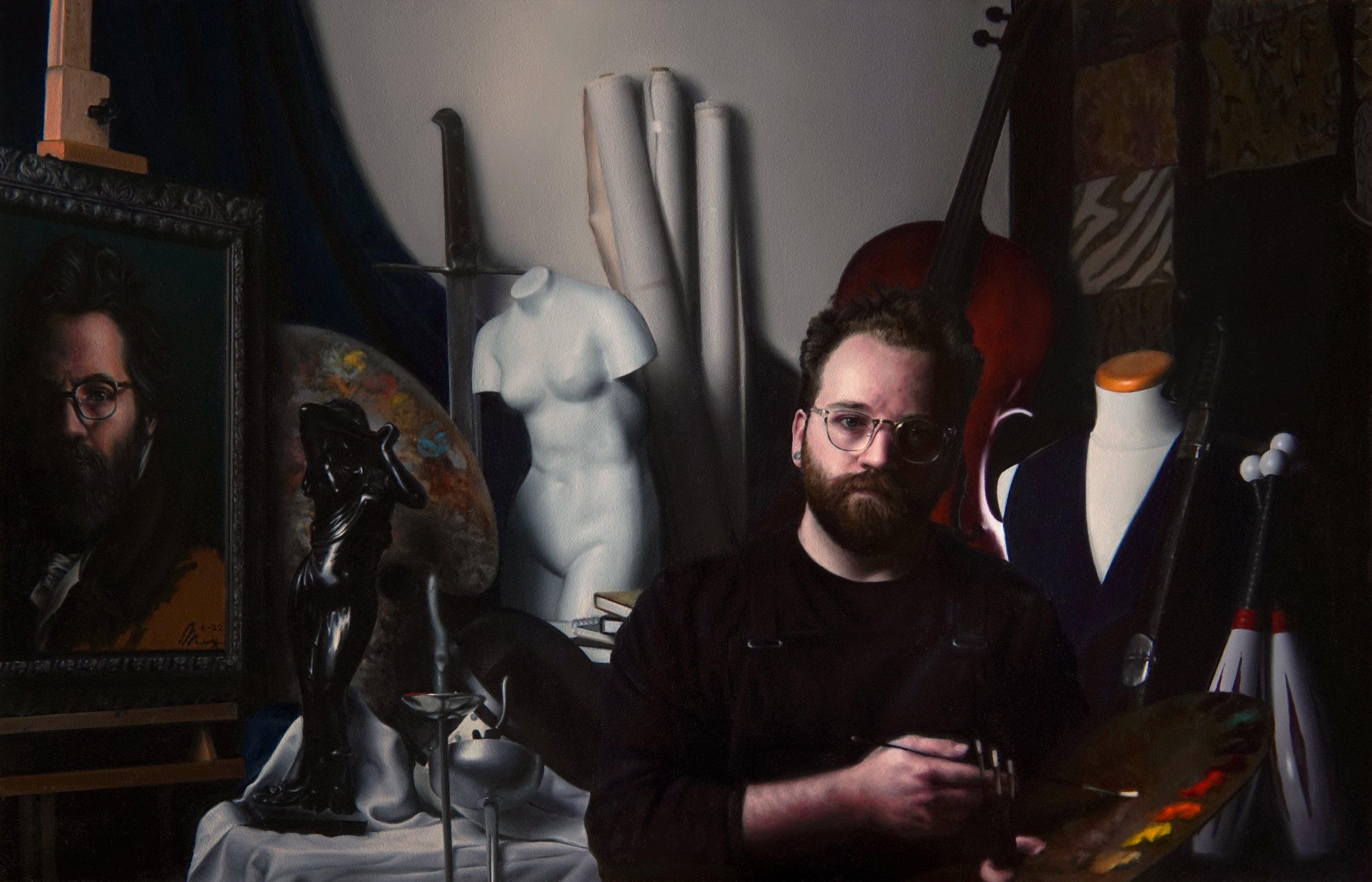
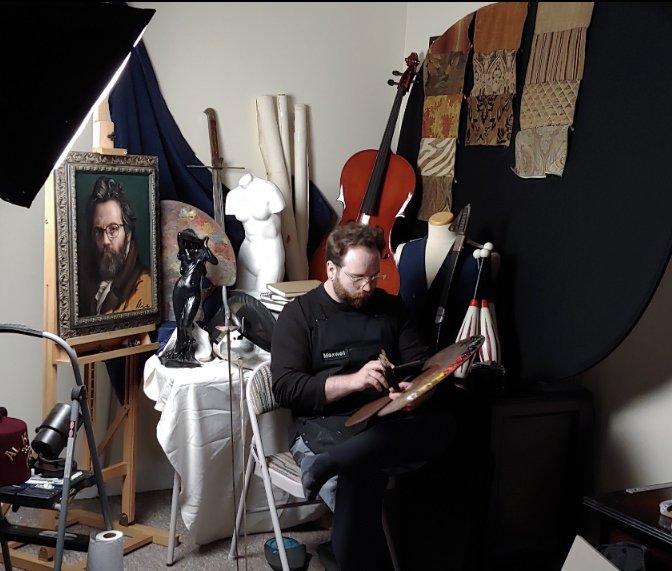
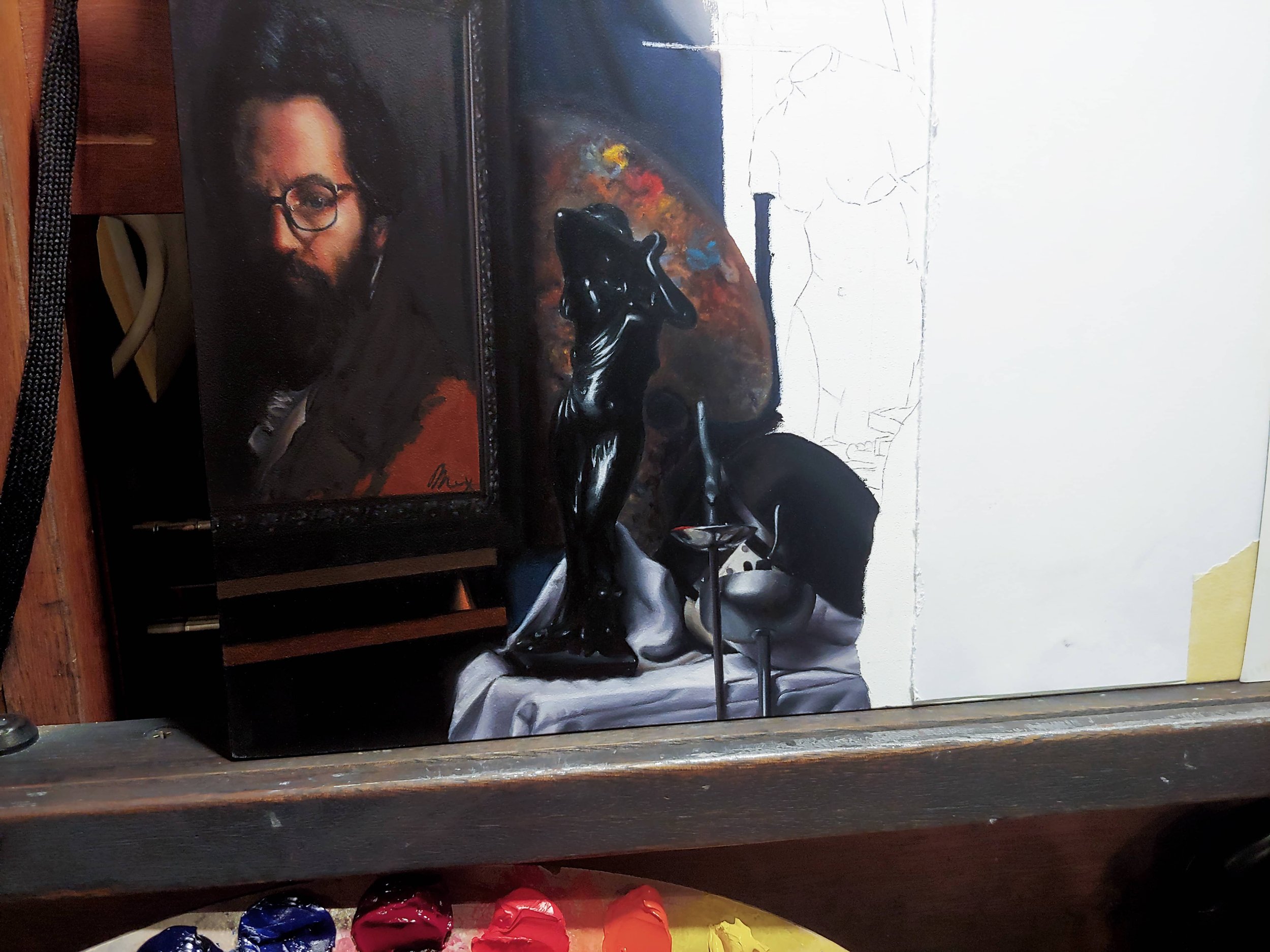
Can you walk us through the technical steps of creating your winning work?
Through rigorous exercises and deliberate practice, I’ve developed a level of automaticity. This has allowed me to do very detailed and technical work like this. Now, I can focus more on the themes of the work and less on the technical aspects of creating it. Once you’ve achieved that, it’s really quite a simple process. Take a lot of reference pictures, draw out the reference on the panel, a simple underpainting, then the high-detail second layer. That’s it!
“Portrait of Olive”
Oil on Panel
By Maxwell G. Miller
What do you hope to communicate to an audience with your work?
My goal is that my work will speak for itself. Each painting has its own unique story, theme, and history. By combining these things, the message of each individual piece is communicated.
“Self Portrait (2020)”
Charcoal
By Maxwell G. Miller
Can you talk about your biggest learning experience during the process of creating your work?
I’m always learning about the artwork that I enjoy the most. I study a lot of art and take note of what I like about it. That way, I can put aspects of it into my own. Through this process, I’m developing my own aesthetic quality. The more I paint, the more I develop. “The Journeyman” is a great example of this. I’ve combined two aspects of art that I really enjoy – dense still life and figure work. Each painting that I do, I get closer to finding my artistic voice.
“Spellbound”
Oil on Panel
By Maxwell G. Miller
Have you experimented with other mediums?
I experimented with many artistic mediums at the start of my career – puppetry, marionettes, sculpture, costumes, masks, backdrops, sets – but I landed on oil painting pretty fast. I painted with acrylics for some time, but as my interest in history painting developed, I learned the mediums of the work that I appreciated the most: charcoal and oil paint. I started using charcoal and oil paint for historical studies, and that’s what I’ve used ever since.
Can you discuss your biggest success since starting your artistic journey?
I’m always learning about the artwork that I enjoy the most. I study a lot of art and take note of what I like about it. That way, I can put aspects of it into my own. Through this process, I’m developing my own aesthetic quality. The more I paint, the more I develop. “The Journeyman” is a great example of this. I’ve combined two aspects of art that I really enjoy – dense still life and figure work. Each painting that I do, I get closer to finding my artistic voice.
“Strawberry Pallette”
Oil on Panel
By Maxwell G. Miller
Can you tell me something you wish you had known before or when you began your career that would have really helped?
Your drive to improve is the biggest determining factor in your success. My growth as an artist has been a very natural progression of learning. The work I did at the beginning of my career continues to be foundational for my work today, and the knowledge I have was discovered by working through challenges and by learning from others with more experience. It’s the desire to grow and develop that makes the biggest difference.
“Dryad’s Spirit in Sunder”
Charcoal
By Maxwell G. Miller
What projects are you working on currently?
My current project is a 14x20” oil painting based on the Lewis Carol poem “The Walrus and the Carpenter” and is presented in the style of a traditional Flemish 17th century still life. Along with it I’m endeavoring to create a companion Dutch ripple mold frame. After that, I’ll be starting my largest painting to date, another narrative oil painting. This one will be reminiscent of early 19th century neoclassical history paintings and theological works. To accompany the piece, I’ll also be constructing an ornamented arched tabernacle frame. Paired, the painting and frame will be over 8ft tall. My intention with pairing these paintings with historically accurate frames is to present the work in a historical context, allowing a contemporary audience to appreciate both art forms as a single piece of traditional art.
What is your dream project or piece you hope to accomplish?
Ha – I’ve got a big, long list. A list nearing 200 painting ideas that I’d like to complete. Most of the ideas are compositionally finished, it’s just never quite the right time for each of them. So, they get put on the list, then one day I’ll come back to them. My dream project is to finish all the paintings on my list someday. The problem is, every time I go back to the list to paint one, I have more ideas and the list grows. More paintings go on the list than come off. Either I’ll have to start running out of ideas or paint a lot faster to complete them all.
“The Tale of the Curious Oysters”
Oil on Panel
By Maxwell G. Miller
As a winner, do you have any advice for artists who want to submit to awards, competitions, residencies, etc.?
Professionally – Write a strong bio and artist statement. Write quality descriptions of each piece. Learn to take high-quality photos or scanned images of your artwork.
Creatively – The best thing you can do is improve your work. It doesn’t matter how good you already are. Get better, and you will have better results.
Lastly, I like to ask everyone what advice they would give to their fellow artists/photographers, what is your advice?
Choose to be successful. Success and failure aren’t things that happen to you, they’re a decision you make when an obstacle is placed in front of you. Stay focused and driven. And remember, not all practice is deliberate practice. Challenge yourself with every work you do, and you will improve. If you aren’t feeling challenged, you’re not getting better.
To view more of Maxwell G. Miller’s work.
